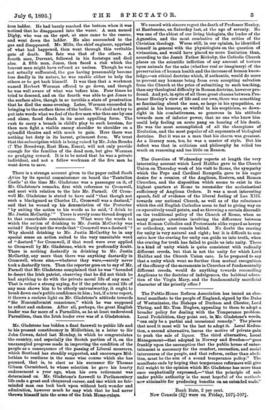We record with sincere regret the death of Professor Huxley,
at Eastbourne, on Saturday last, at the age of seventy. He was one of the ablest of our living biologists, the leader of the Agnostics, and the most combative of the critics of the Christian theology. Worse still, in our opinion, he identified himself in general with the physiologists on the question of vivisection, and would have placed no more limitation than, according to the Jesuit Father Rickaby, the Catholic Church places on the scientific infliction of any amount of torture upon animals for the sake (whether real or imaginary) of the preservation of human health and the increase of human know- ledge,—an ethical doctrine which, if authentic, would do more to prevent any humane being from even accepting salvation from the Church at the price of submitting to such teaching, than any theological difficulty in Roman doctrine, however pro- found. And yet, in spite of all these great chasms between Pro- fessor Huxley's view of life and our own, there was something so fascinating about the man, so large in his sympathies, so genial in his humour, so wistful in his scepticism, so down- right in his combativeness, so generous in his attitude towards men of inferior power, that no one who knew him could help feeling an acute pang on hearing of his death. He was the most accomplished of all the champions of Evolution, and the most popular of all exponents of biological doctrine. But it was as a man that his charm was greatest. As a literary man, too, he was a master of style. But his defect was that in criticism and philosophy he relied too much on reasoning and too little on Reason.








































 Previous page
Previous page